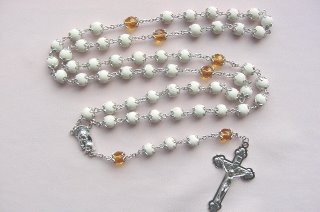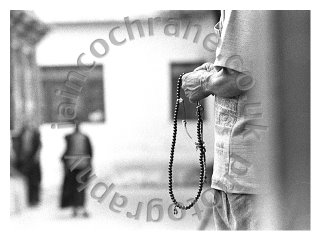My understanding of the month of rosary is just like the mega-sale-carnival months where sale and discounts are happening throughout the stores nationwide and people will shop throughout this shopping month. But, unfortunately...hehe. It doesn't really goes the same way to the month of the rosary to me. Which in the first place, I should.
Hehe *Grin sheepishly
Somehow, I did pray the rosary also la. Now, at work, exam in progress. Invigilation is not the favourite thing that I want to do. Out of the 2 hours of invigilation, ...*shhh..I am not suppose to do this by the way*...half an hour out of that will be used for rosary prayers. Yes...in the classroom where I invigilate. Strange but true.
One thing that really caught my attention is this one...observe these pictures



Need I explain what are those? Ok2. Rosary, Buddhist prayer beads (don't know its real name) and tasbih. Despite the difference in the religious practice, there are of course similarities in some ways. It is quite fascinating! Especially if you got to know the history of those prayer beads...
Eager to know more, I searched the history of rosary and all I found was rather boring with same stuff and very historically written (*of course la,its history, stupid me). Except for this one
HISTORY of the ROSARY "KNOCK ON WOOD" Often we use the phrase, "Knock on wood" - and proceed to do just that: knock on a table or a door or whatever wood is handy. Most do not know that the origin of the phrase and practice comes from the rosary. Rosaries in the old days were made of oak wood and were fingered in time of distress or trouble. Thus, holding on to or rubbing the wooden rosary or its wooden crucifix when danger was near became a common way for Christians to deal with hardships and difficulties. The practice slipped into common use as "Knock on wood."

No comments:
Post a Comment